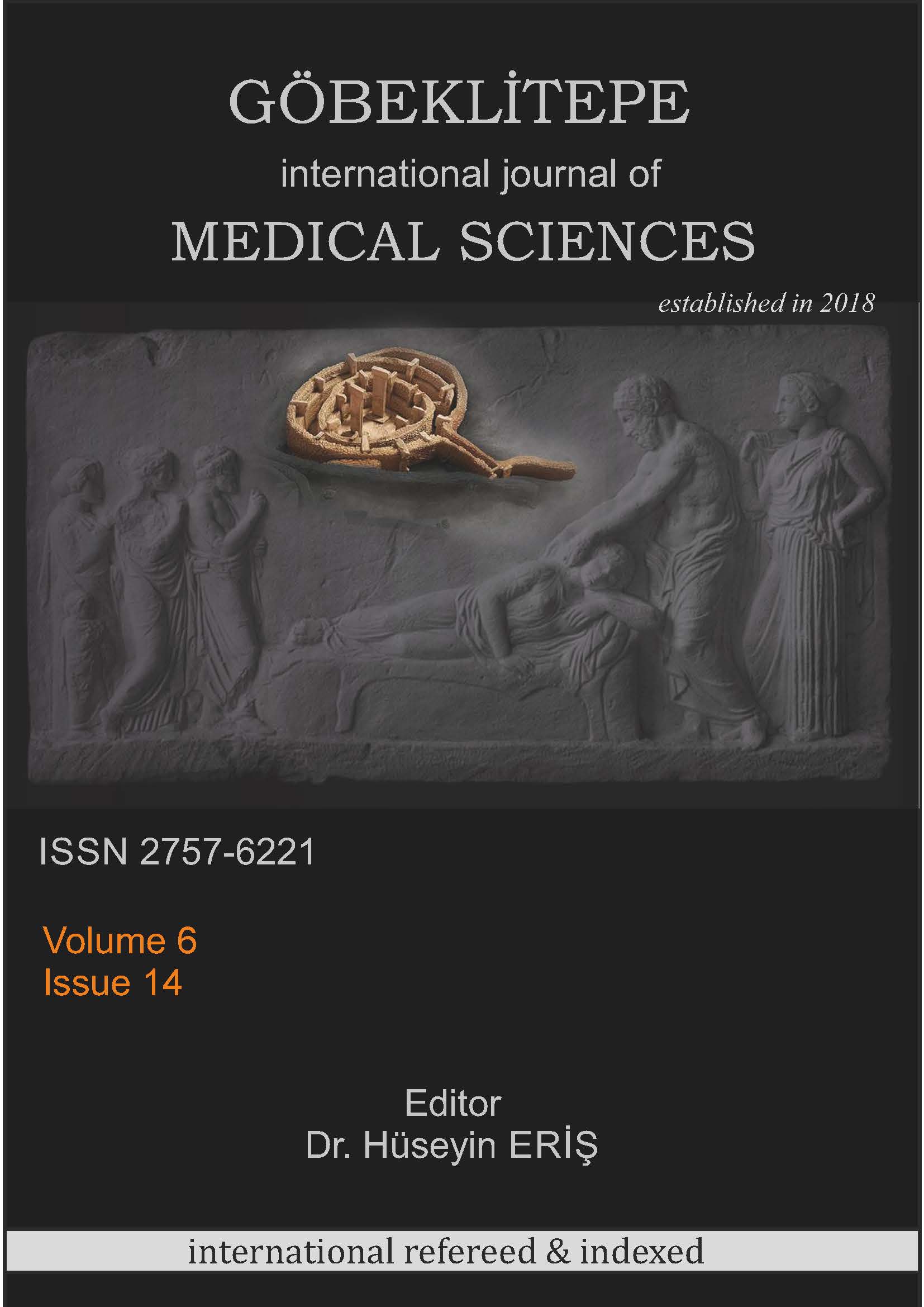THE RELATIONSHIP BETWEEN COVID-19 FEAR, DEPRESSION, AND SPIRITUAL WELL-BEING IN UNIVERSITY STUDENTS
COVID-19 FEAR, DEPRESSION, AND SPIRITUAL WELL-BEING
DOI:
https://doi.org/10.55433/gsbd.248%20Keywords:
COVID -19, Depression, Spiritual Well-Being, University Student.Abstract
Spiritual values and spirituality are crucial in preventing mental issues such as depression and solitude in student life. In this descriptive research, we aimed to investigate the relationship between COVID-19 fear, depression and spiritual well-being in university students. We found a statistically significant difference between the department in which the students are educated and the total levels of the Spiritual Well-Being Scale (p<0.05). As students' fear of COVID-19 increased, their psychological well-being scores decreased. Moreover, a statistically significant, moderate and negative relationship was observed between the COVID-19 fear scale and spiritual well-being levels (r=-0.495; p<0.001). We determined that the 2nd-year students of the First and Emergency Aid Program who attend their clinical practice had higher depression levels and lower spiritual well-being levels compared to other departments. It may be recommended that university students participate in appropriate psychosocial programs aimed at depression and factors that negatively affect their mental health and that these factors be taken into account in school curricula.
References
Torales, J. O’Higgins, M. Castaldelli-Maia, J.M. Ventriglio, A. (2020). The outbreak of COVID-19 coronavirus and its impact on global mental health. International Journal of Social Psychiatry. 66(4), 317–320. https://doi.org/10.1177/0020764020915212
Wang, C. Pan, R. Wan, X. Tan, Y. Xu, L. Ho, C.S. Ho, R.C. (2020). Immediate psychological responses and associated factors during the ınitial stage of the 2019 Coronavirus Disease (COVID-19) epidemic among the general population in china.International Journal of Environmental Research and Public Health.17(5), 1729. https://doi.org/10.3390/ijerph17051729
Pakpour, A. H. Griffiths, M.D. (2020). The fear of COVID-19 and its role in preventive behaviors. Journal of Concurrent Disorders. 2 (1), 58-63.
World Health Organization, Health duriıng COVID-19. (2022). https://www.who.int/news/item/02-03-2022-covid-19-pandemic-triggers-25-increase-in-prevalence-of-anxiety-and-depression-worldwide. Accessed: 13.04.2022.
Hernández-Torrano, D. Ibrayeva, L. Sparks, J. Lim, N. Clementi, A. Almukhambetova, A. Nurtayev, Y. Muratkyzy, A. (2020). Mental health and well-being of university students: a bibliometric mapping of the literature. Frontiers in Psychology, 9(11), 1–16. https://doi.org/10.3389/fpsyg.2020.01226
Hui Chew, Q. Chiah Wei, K. Vasoo, S. Choon Chua, H. Sim, K. (2020). Narrative synthesis of psychological and coping responses towards emerging infectious disease outbreaks in the general population: practical considerations for the COVID-19 pandemic. Singapore Meical Journal. 61(7), 350–356. https://doi.org/10.11622/smedj.2020046
Cao, W. Fang, Z. Hou, G. Han, M. Xu, X. Dong, J. Zheng, J. (2020). The psychological impact of the COVID-19 epidemic on college students in China. Psychiatry Res. 287:112934. https://doi.org/ doi: 10.1016/j.psychres.2020
Rotenstein, L.S. Ramos, M.A. Torre, M. Segal J.B. Peluso M.J. Guille, C. Sen, S. Mata D.A. (2016). Prevalence of depression, depressive symptoms, and suicidal ıdeation among medical students: a systematic review and meta-analysis. JAMA. 316(21): 2214–2236. doi:10.1001/jama.2016.17324
Gritsenko, V. Skugarevsky, O. Konstantinov, V. Khamenka, N. Marinova, T. Reznik, A. Isralowitz, R. (2020). COVID 19 fear, stress, anxiety, and substance use among russian and belarusian university students. International Journal of Mental Health and Addiction. 19(6):2362–2368. https://doi.org/10.1007/s11469-020-00330-z
Ramos-Lira, L. Rafful, C. Flores-Celis, K. Mora Ríos, J. García-Andrade, C. Rascón Gasca, M.L. Bautista Aguilar, N. Cervantes Muñoz, C. (2020). Emotional responses and coping strategies in adult Mexican population during the first lockdown of the COVID-19 pandemic: An exploratory study by sex. Salud Mental, 43(6), 243-251
Hannemann, J. Abdalrahman, A. Erim, Y. Morawa, E. Jerg-Bretzke, L. Beschoner, P. Geiser, F. Hiebel, N. Weidner, K. Steudte-Schmiedgen, S. Albus, C. (2022). The impact of the COVID-19 pandemic on the mental health of medical staff considering the interplay of pandemic burden and psychosocial resources-A rapid systematic review. PLoS ONE, 17(2): e0264290 https://doi.org/10.1371/journal.pone.0264290
Yazıcıoğlu Y, Erdoğan S. SPSS uygulamalıbilimselaraştırmayöntemleri. Ankara, Turkey, 2014
Satici, B. Gocet-Tekin, E. Deniz, M.E. Satici, S.A. (2021). Adaptation of the fear of COVID-19 scale: ıts association with psychological distress and life satisfaction in Turkey. International Journal of Mental Health and Addiction, 19(6):1980-1988. https://doi.org/10.1007/s11469-020-00294-0
Hisli, N. (1989). Beck depresyon envanterinin üniversite öğrencileri için geçerliliği, güvenilirliği. Psikoloji Dergisi, 7 (23), 3–13.
Ekşi, H. Kardaş, S. (2017). Spiritual well-being: Scale development and validation.Spırıtual Psychology and Counselıng, 2(1), 73–88. https://doi.org/10.12738/spc.2017.1.0022
Bakioğlu, F. Korkmaz, O. Ercan, H. (2021). Fear of COVID-19 and positivity: Mediating role of ıntolerance of uncertainty, depression, anxiety, and stress.International Journal of Mental Health and Addiction. 19(6):2369-2382. https://doi.org/10.1007/s11469-020-00331-y
Flett, G.L. Hewitt, P.L. Nepon, T. (2020). The self-generated stress scale: development, psychometric features, and associations with perfectionism, self-criticism, and distress. Journal of Psychoeducational Assessment. 38(1), 69–83. https://doi.org/10.1177/0734282919879542
Radwan, E. Radwan, A. Radwan, W. Pandey, D. (2020). Prevalence of depression, anxiety and stress during the COVID-19 pandemic: a cross-sectional study among Palestinian students (10-18 years). BMC Psychology. 9:187. https://doi.org/10.1186/s40359-021-00688-2
Eriş, H. Karasu, F. Ayar, D. (2023). Perceptions of vaccine trust and conspiracy among those with COVID-19 vaccine hesitancy and resistance: a cross-sectional study. Global Health Promotion. 0(0): 1–10; 1174750. https://doi.org/10.1177/17579759231174750
Huang, Y. Zhao, N. (2020). Generalized anxiety disorder, depressive symptoms and sleep quality during COVID-19 outbreak in China: a web-based cross-sectional survey. Psychiatry Research. 288:112954. https://doi.org/10.1016/J.PSYCHRES.2020.112954
Hughes, J. N. Cao, Q. Kwok, O.M. (2016). Indirect effects of extracurricular participation on academic adjustment via perceived friends’ prosocial Norms. Journal of Youth and Adolescence. 45(11):2260-2277. https://doi.org/10.1007/s10964-016-0508-0
Kaplan Yatğın, S. Öztürk Tonguç, M. (2020). Covid-19 pandemisinde diş hekimliği. Süleyman Demirel Üniversitesi Sağlık BilimleriEnstitüsüDergisi. 11(3), 376-382 .https://doi.org/10.22312/sdusbed.791701
Zhang, S.X. Wang, Y. Rauch, A. Wei, F. (2020). Unprecedented disruption of lives and work: Health, distress and life satisfaction of working adults in China one month into the COVID-19 outbreak. Psychiatry Research. 288:112958. https://doi.org/10.1016/J.PSYCHRES.2020.112958
Shamsuddin, K. Fadzil, F. Salwina, W. Ismail, W. Shah, S.A. Omar, K. Muhammad, N.A. Jaffar, A. Ismail, A. Mahadevan, R. (2013). Correlates of depression, anxiety and stress among Malaysian university students. Asian Journal of Psychiatry, 6(4):318-23. https://doi.org/10.1016/j.ajp.2013.01.014
Söylemez, F. Özer, A. (2018). Bitlis Eren Üniversitesi sağlık hizmetleri meslek yüksekokulu öğrencilerinde depresyon prevalansı ve ilişkili faktörler. Sakarya Tıp Dergisi. 2018, 8(3):551-561
Satici, B. Saricali, M. Satici, S. A. Griffiths, M.D. (2020). Intolerance of uncertainty and mental well-being: serial mediation by rumination and fear of COVID-19. International Journal of Mental Health and Addiction. 20(5):2731-2742.doi:10.1007/s11469-020-00305-0
Shara, N. Wang, Q. Wagner, G.G. Lin, C.Y. Fernández-Castillo, E. Gerymski, R. Dymecka, J. Machnik-Czerwik, A. Derbis, R. Bidzan, M. (2021). Fear of COVID-19 and life satisfaction: the role of the health-related hardiness and sense of coherence. Frontiers in Psychiatry. 12(1), 712103. https://doi.org/10.3389/fpsyt.2021.712103
Singh Negi, A. Khanna, A. Aggarwal, R. (2021).Spirituality as predictor of depression, anxiety and stress among engineering students.Journal of Public Health. 29(1), 103–116. https://doi.org/10.1007/s10389-019-01092-2/Published
Pong, H.K. (2018). Contributions of religious beliefs on the development of university students’ spiritual well-being. Internatıonal Journal Of Chıldren's Spırıtualıty. 23(4): 429–455. https://doi.org/10.1080/1364436X.2018.1502164.
Downloads
Published
Versions
- 2024-07-02 (2)
- 2023-12-24 (1)
How to Cite
Issue
Section
License
Copyright (c) 2023 Göbeklitepe Sağlık Bilimleri Dergisi

This work is licensed under a Creative Commons Attribution 4.0 International License.




